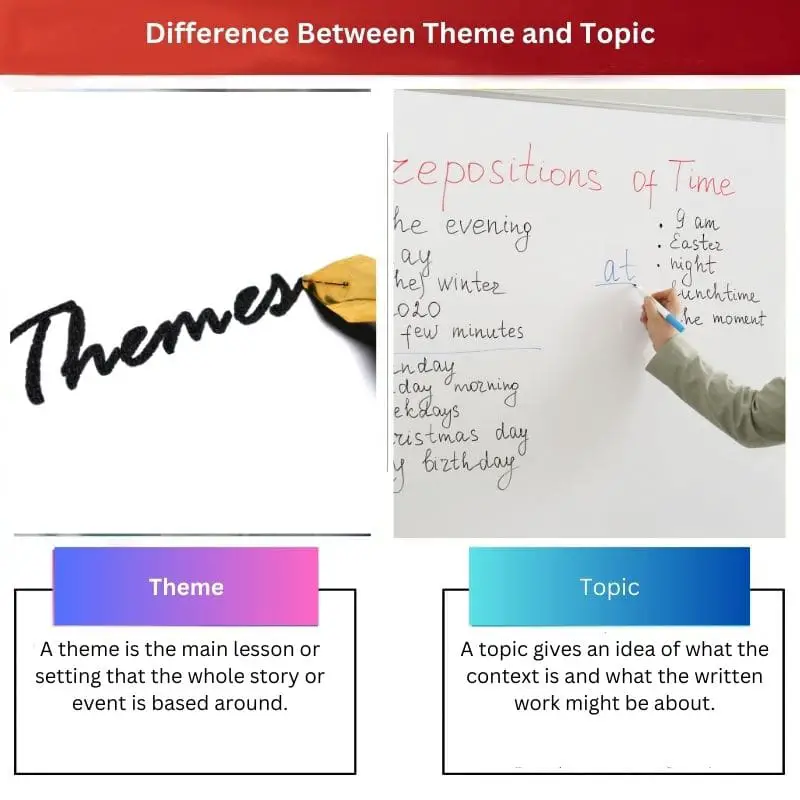Theme and topic are commonly seen in novels or illustrations and support the conveyed main context. Here, in some form or way, the primary subject matter is given meaning to help the reader better understand the context.
Key Takeaways
- A topic is a subject matter or main idea of a piece of writing, conversation, or another form of communication.
- A theme is an underlying message, moral, or lesson throughout a story, narrative, or artistic work, addressing broader issues or universal human experiences.
- The primary distinction between a topic and a theme is that a topic serves as the focus of a discussion. In contrast, a theme conveys a deeper meaning or insight that transcends the surface-level subject matter.
Theme vs Topic
A theme is an English term used to describe a specific message or insight that is conveyed through the topic and explored throughout a certain work. A topic is an English word used to describe the general subject matter or underlying idea behind a piece of writing or conversation.

A theme is used to describe a lesson or meaning behind a story or an event. These events and written works are entirely based on the theme, and the characters are structured around it.
A topic conveys the central subject matter and lets the reader connect the context of the written work directly to a sentence or a word. It gives a brief idea of the context.
Comparison Table
| Parameters of comparison | Theme | Topic |
|---|---|---|
| Definition | A theme is the main lesson or setting that the whole story or event is based around. | A topic gives an idea of what the context is and what the written work might be about. |
| Purpose | It allows an individual or author to convey a message or impart knowledge by incorporating the theme in the story. | It gives the reader a “brief” insight and a basic understanding of the subject matter. |
| Objective view | Considered to be the essence of the story, and at times provides a vague or broad interpretation of the story. | A topic provides more of a clear and more focused view of the subject matter. |
| Example | A story’s theme can be “honesty is the best policy”, or an event can have a “birthday theme. | Topics can be about specific matters such as “Lasers and how they work” or “Wildlife and the animal kingdom”. |
| Synonyms | The synonyms of theme that relate directly are – concept, message, thesis, and idea. | The synonyms of related topics are subject matter, discussion, point, and concern. |
What is Theme?
The theme helps individuals understand the background and the setting of the story or event. The theme gives an overall understanding and meaning of the story’s context.
Every novel or storybook has an underlying theme that gives structure to the story and provides a more in-depth look into the author’s mind. The article allows users to get a sense of the background behind the story.
The theme allows the author to impart knowledge and lessons through their stories. There might be many hidden meanings in the story, but there is always an underlying theme around which the story revolves.
A theme can be seen in many places other than just written works, such as the theme of a party or an event. People organize events and base them on an idea or “Theme”, and all the attendees follow this “Theme”.
The theme of an event can range from “Birthday parties” to “Halloween-themed parties” and many more variations. The theme of a book or story can revolve around basic principle ideas such as “Always help a friend” or “Being honest.”
Themes provide a broader perspective and do not just focus on one main idea at a time.

What is Topic?
A topic gives the reader a brief understanding with the help of a sentence, phrase, or even a word. The topic can be seen to be the main title or the heading of an article or story,
The context does not revolve around the topic; the topic instead gives us a look into the subject matter.
Topics allow the person to grasp a small idea of the context, and authors use it to entrap the reader and interest them in the stories being conveyed.
One can also see topics in places like debates, casual discussions, professional ones, and many educational books. And issues can range from many things, such as “Human psychology” to “The various fruits and vegetables.”
A topic gives the reader a focused objective view of the subject matter and lets them know what idea is conveyed.

Main Differences Between Theme and Topic
- The theme is the central idea around which a story or event is based, while a topic is just a sentence or word that talks directly about the story’s context.
- The author uses a theme to convey a message or to impart knowledge to the reader, while the topic gives a brief insight into the story or discussion.
- A theme gives the reader several broad perspectives, while a topic provides a focused view.
- Themes can talk about general principles and ideologies, while a topic can be about several specific things such as science, philosophy, etc.
- Words related to the theme are concept, message, thesis, and idea, while those related are subject matter, discussion, point, and concern.


The article provides a well-rounded view of themes and topics, making literary analysis more accessible to readers.
Absolutely, the examples and explanations are quite beneficial in understanding these concepts.
This article effectively delineates the distinction between themes and topics, offering valuable insights for readers.
It’s certainly a fantastic resource for anyone interested in delving deeper into literary analysis.
The examples and comparisons make it easier to grasp the nuances of themes and topics.
The article effectively explains the role and significance of themes and topics, making it easier to appreciate literary works.
I found the comparison table very helpful in understanding the key differences between theme and topic.
I appreciate the detailed comparison between theme and topic, it makes it easier to understand the difference.
I completely agree. It’s always helpful to have a clear understanding of these literary terms.
The article presents a comprehensive overview of themes and topics, providing clarity and understanding for readers.
I wholeheartedly agree. It’s a fantastic resource for literary exploration.
This article provides a comprehensive understanding of themes and topics in literature. Very informative!
Certainly, the examples given really clarify the concepts.
I couldn’t agree more, it’s a great resource for those looking to enhance their literary analysis skills.
The distinction between themes and topics is made quite clear in this article. It’s a valuable read for literary enthusiasts.
I couldn’t agree more. It’s an insightful guide to understanding literary elements.
The article effectively elucidates the differences between themes and topics, making it a valuable read for all interested in literature.
Certainly, the article provides a clear and insightful comparison of these literary elements.
The detailed breakdown of themes and topics is truly enlightening. It’s a great resource for literature enthusiasts.
The distinction between the purpose of theme and topic is well explained. It helps to understand their role in a literary work.
Absolutely, it’s essential to discern the purpose to appreciate the depth of a story.
I found the objective view section particularly enlightening.
The article effectively breaks down the differences between theme and topic to offer a clear understanding.
I appreciate how the article emphasizes the significance of themes and topics in literary works.
Yes, it’s quite valuable for students and enthusiasts of literature alike.